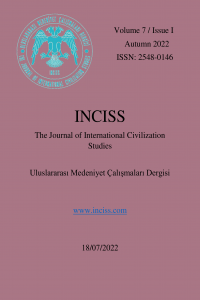Research Article
Aim & Scope
The age we live in is the age of absolute information. Consequently, the information content and diversity we have to acquire has increased considerably. The limitation to a single discipline contradicts the above-mentioned fact The increase in interdisciplinary studies and the fact that academics have knowledge at the level of expertise in a few disciplines apart from their areas of expertise is a necessity brought by the age. Therefore, the main policy of the Journal of International Civilisation Studies is interdisciplinary work, and we believe that such a publication policy will make the greatest contribution to our civilisation.
The Journal of International Civilisation Studies aims to bring a new voice to the world of science through its multidisciplinary structure.
Our journal is not a publication of any official or unofficial institution or organisation. It does not receive financial support from any person or institution
The Journal of International Civilization Studies (INCISS) publishes all papers according to the open access model defined in the Budapest, Berlin and Bethesda open access statements. The full content of the papers published by INCISS allows anyone to read, download, print, use and reuse. Published papers are distributed under a Creative Commons Attribution 4.0 International license. INCISS will always provide free publications to all readers anywhere in the world without any obligation or restriction.
INCISS publishes papers using many methods such as experimental, theoretical and empirical, statistical, analytical, case studies, field studies, book reviews that contribute to social science disciplines as well as multidisciplinary research.
The Journal of International Civilization Studies is an international peer-reviewed journal published twice a year in spring and autumn. All responsibility in terms of language, science and law for all papers published in The Journal of International Civilization Studies belongs to the authors and the rights of publication belong to www.inciss.com. It may not be published or reproduced in whole or in part in any way without the written permission of the publisher. The Editorial Board has the right to publish or not to publish papers submitted to the journal. Manuscripts submitted to the journal will not be returned.
Each paper must be scanned in i-thenticate plagiarism software and a screening report must be sent to the journal's email address.
Author Guidelines
Writing and Publication Principles
The Journal of International Civilisation Studies is an international peer-reviewed journal published twice a year, in May and November.
Submission of a paper to the Journal of International Civilisation Studies is accepted as an application for publication. No copyright fee can be charged for a paper.
All legal responsibility for papers submitted and/or published in the Journal of International Civilisation Studies belongs to the author.
The Journal of International Civilization Studies has the right to make corrections, to publish or not to publish papers.
The publication languages are Turkish, English and Russian.
Click for Publication Principles and Writing Rules
Click for Copyright Transfer Form
Ethical Principles and Publication Policy
Papers sent to the Journal of International Civilisation Studies must comply with the ethical principles outlined below.
Co-authorship: The authors should be limited to those who have made significant contributions to the submitted paper. The authors of the paper should be finalized before the presentation of the paper. It is unacceptable to include the names of those who did not participate in the research (gift authorship) or not to include the names of those who contributed (ghost authorship).
Acknowledgements: Authors are required to list the organisations or individuals who have supported the work they have sent.
Authenticity and freedom from plagiarism: The submitted work should belong entirely to its authors. If the work of other researchers is included in the paper, it should be cited appropriately and these studies should be listed in the references. The author is responsible for checking the paper using one of the plagiarism prevention software Turnit-in or iThenticate and sending a similarity report to the journal as an application to the paper. Papers with a similarity score of 15% or more will not be evaluated.
Ethics committee permission and approval: Questionnaire, scale, interview, observation, etc. from participants. The paper should state that ethics committee approval is obtained for studies that require data collection in different ways. The research should provide evidence of sensitivity to ethical issues in the data collection process (e.g. obtaining permission to use scales, questionnaires, photographs belonging to others).
Slicing: Authors should not analyse research results in a way that compromises the integrity of the study and inappropriately split it into more than one issue and submit these publications as separate publications for academic appointments and promotion.
Submission and storage of raw data. Authors are obliged to submit the raw data of their research at the request of the editor and reviewers and to keep this data after publication of their papers.
Detection of errors in published papers: when an author discovers a significant error or inaccuracy in a paper he/she have published in the Journal of International Civilization Studies, he/she must immediately notify the journal editor and cooperate with him or her to withdraw or correct the paper.
Price Policy
It is free to make a publication in our Journal

